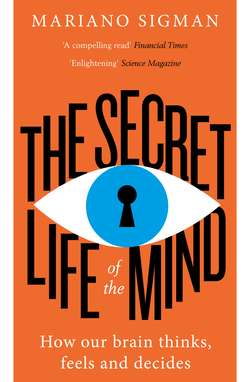Читать книгу The Secret Life of the Mind: How Our Brain Thinks, Feels and Decides - Mariano Sigman - Страница 9
The genesis of concepts
ОглавлениеIn the late seventeenth century, an Irish philosopher, William Molyneux, suggested the following mental experiment to his friend John Locke:
Suppose a man born blind, and now adult, and taught by his touch to distinguish between a cube and a sphere [ … ] Suppose then the cube and the sphere placed on a table, and the blind man made to see: query, Whether by his sight, before he touched them, he could now distinguish and tell which is the globe, which the cube?
Could he? In the years that I have been asking this question I’ve found that the vast majority of people believe that the answer is no. That the virgin visual experience needs to be linked to what is already known through touch. Which is to say, that a person would need to feel and see a sphere at the same time in order to discover that the gentle, smooth curve perceived by the fingertips corresponds to the image of the sphere.
Others, the minority, believe that the previous tactile experience creates a visual mould. And that, as a result, the blind man would be able to distinguish the sphere from the cube as soon as he could see.
John Locke, like most people, thought that a blind man would have to learn how to see. Only by seeing and touching an object at the same time would he discover that those sensations are related, requiring a translation exercise in which each sensory mode is a different language, and abstract thought is some sort of dictionary that links the tactile words with the visualized words.
For Locke and his empiricist followers, the brain of a newborn is a blank page, a tabula rasa ready to be written on. As such, experience goes about sculpting and transforming it, and concepts are born only when they acquire a name. Cognitive development begins on the surface with sensory experience, and, then, with the development of language, it acquires the nuances that explain the deeper and more sophisticated aspects of human thought: love, religion, morality, friendship and democracy.
Empiricism is based on a natural intuition. It is not surprising, then, that it has been so successful and that it dominated the philosophy of the mind from the seventeenth century to the time of the great Swiss psychologist Jean Piaget. However, reality is not always intuitive: the brain of a newborn is not a tabula rasa. Quite the contrary. We already come into the world as conceptualizing machines.
The typical café discussion reasoning comes up hard against reality in a simple experiment carried out by a psychologist, Andrew Meltzoff, in which he tested a version of Molyneux’s question in order to refute empirical intuition. Instead of using a sphere and a cube, he used two dummies: one smooth and rounded and the other more bumpy, with nubs. The method is simple. In complete darkness, babies had one of the two pacifiers in their mouths. Later, the pacifiers are placed on a table and the light is turned on. And the babies looked more at the pacifier they’d had in their mouths, showing that they recognize it.
The experiment is very simple and destroys a myth that had persisted over more than three hundred years. It shows that a newborn with only tactile experience – contact with the mouth, since at that age tactile exploration is primarily oral as opposed to manual – of an object has already conceived a representation of how it looks. This contrasts with what parents typically perceive: that newborn babies’ gazes often seem to be lost in the distance and disconnected from reality. As we will see later, the mental life of children is actually much richer and more sophisticated than we can intuit based on their inability to communicate it.
